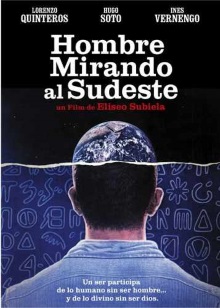
Man Facing Southeast is a film that I would never have heard about in the ordinary course of things. It’s an Argentine movie by Eliseo Subiela with some science-fiction overtones that was one of the recommendations from a Broken Forum member when I asked about interesting South American films.
The premise here isn’t anything we haven’t seen before. A psychiatrist, Dr. Julio Denis, is intrigued to learn of an extra patient in his hospital who seems to have appeared from nowhere. Calling himself Rantés, he claims to be an image projected from far away, possibly by an extraterrestrial civilization. The film’s title derives from his habit of standing for hours facing in a particular direction, in order to receive and transmit information or so he claims. Dr. Denis believes that Rantés is faking it but grows to like him after seeing his obvious talent in a variety of fields and how his presence seems to reassure and help the other patients.
It’s an idea that has been explored in numerous other movies and even television shows. Here it is enriched by the philosophical banter between the two main characters as Rantés tries to convince Dr. Denis that the mainstream conception of what insanity means is misguided, especially when sanity appears to encompass willfully ignoring the suffering of others. Again, nothing really new but the multiple levels of meaning here give the film that extra bit of depth. It becomes clear that even more than a strange alien from outer space, Rantés is a Christ-like figure in the modern world.
As usual, I find myself more drawn to films just because they’re not American and Man Facing Southeast is no exception. It doesn’t have any exceptional cinematography going for it, but its scenes do have a gritty look that makes it feel grounded for all the fantastic goings-on in it. Hugo Soto deserves at least a shout-out for playing an enigmatic Rantés who manages to be likable without needing to be cutesy. I am amused by the thought that the scene in which the lunatics crazily parade around the asylum would have felt very different if it had been accompanied with something other than Ode to Joy.
Still while this is a better than average movie, I don’t think it’s anything worth going out of your way for. It’s main claim to fame these days seems to be that the 2001 American movie K-PAX ripped off of it while being a far inferior work.